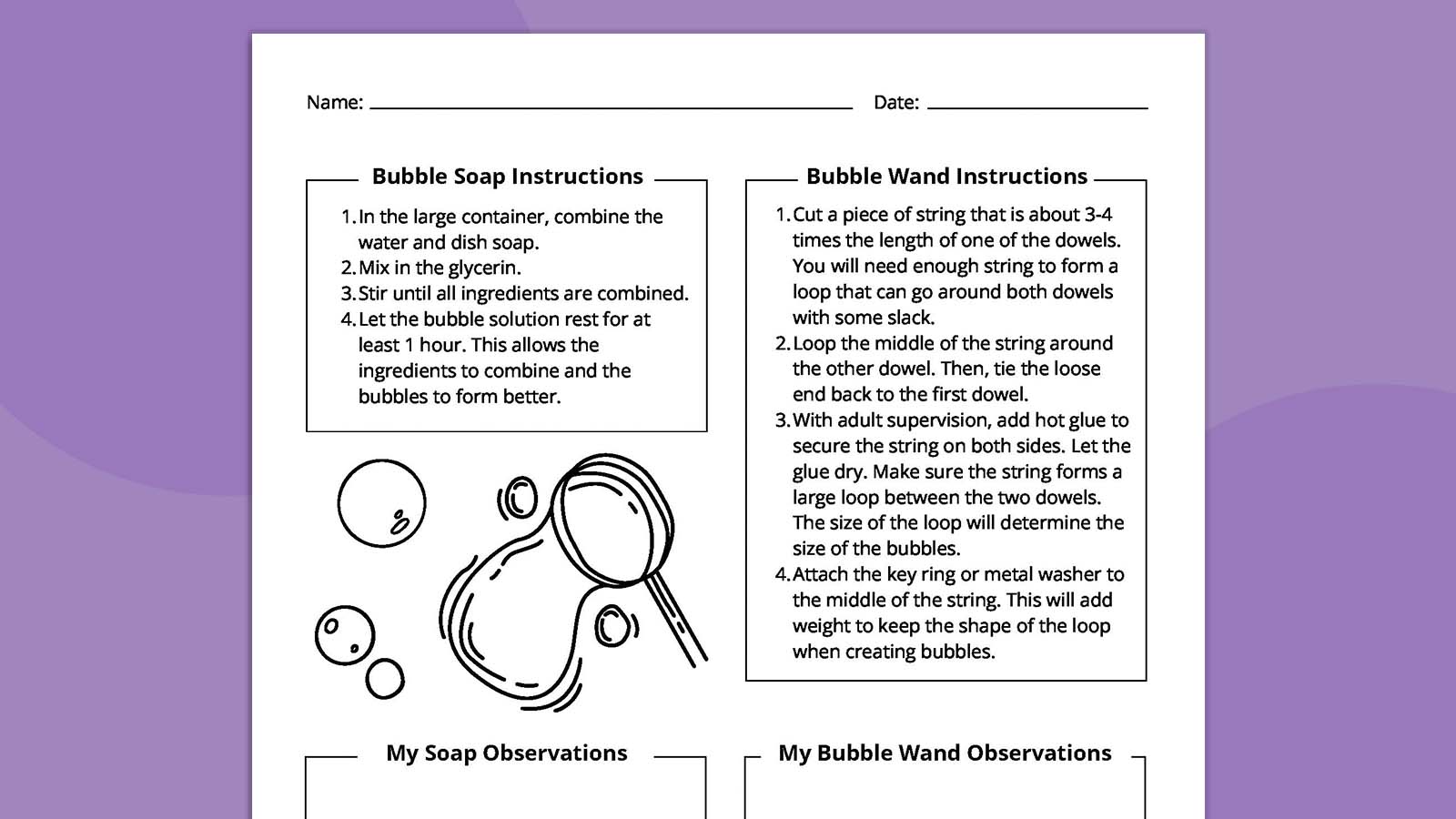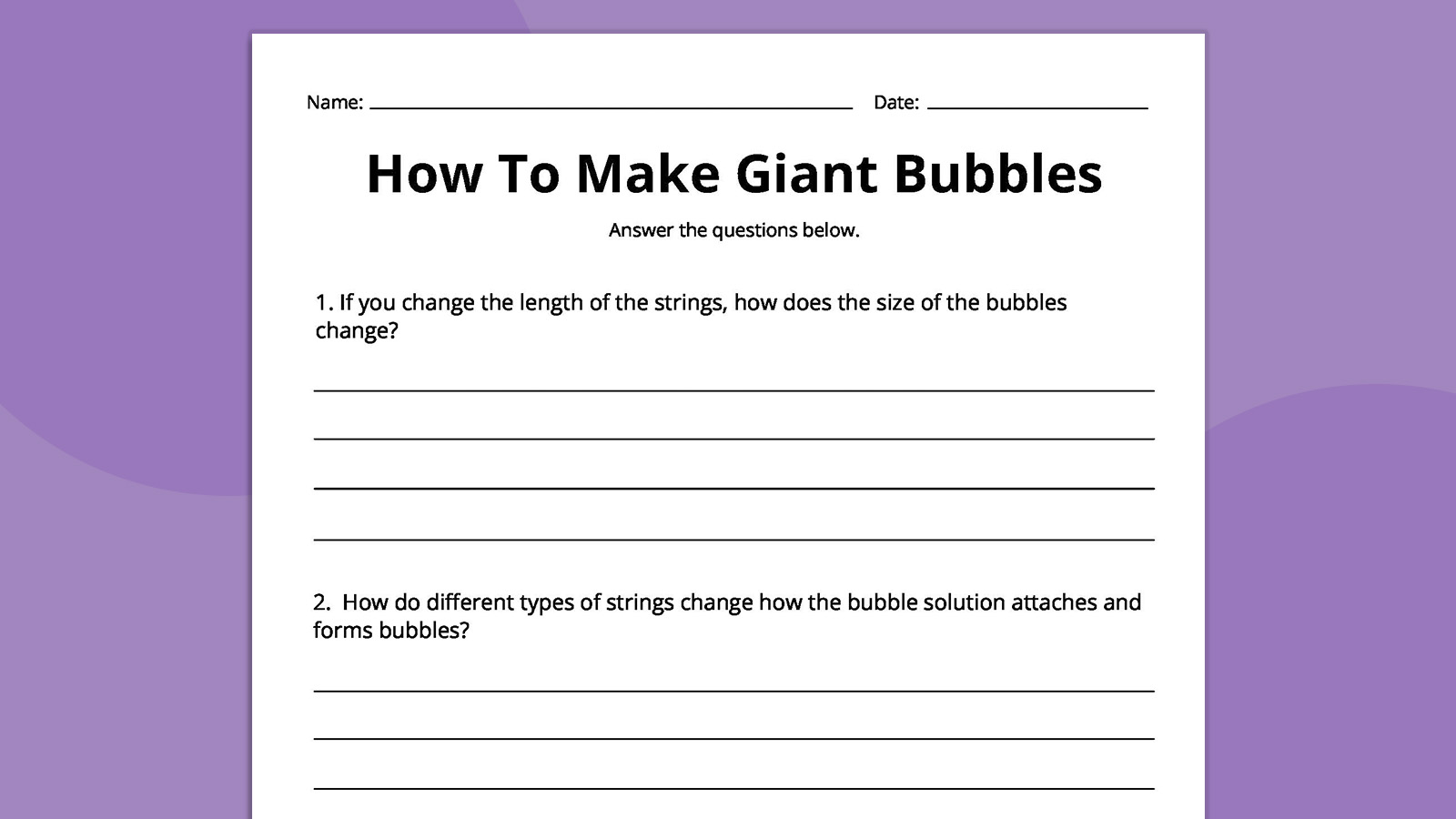Blowing bubbles outside is a fun activity, but you can make it even better! Learn how to make your own large bubbles and create a bubble wand. Only a few items are needed to create these huge bubbles.
Plus, be sure to fill out the form on this page to get your free downloadable Giant Bubbles worksheet with instructions and questions for kids to answer about their experiment.
How do giant bubbles form?
Soap bubbles themselves are a chemistry experiment. The hydrophilic molecule in soap attracts water, and the hydrophobic molecule in soap repels water. When the bubble wand is added to the soapy water solution, the molecules attach to the wand. As the wand moves, a bubble starts to form. At first, the bubbles look oblong. But once the soap layer is closed, a round bubble is formed. The outside of the bubble is more than just soap though. Think of it as a sandwich: There are two layers of soap molecules on either side of a thin layer of water. This layering of soap and water traps the air to form a bubble.
Why are bubbles round?
No matter what shape a bubble wand is, bubbles will always be round, or a sphere. The air inside of a bubble is always working against the outside forces known as surface tension. Thus, a sphere is the best shape for these molecules to fill the space and be as tight as possible.
With the bubble wand, notice the different sizes of spheres, or bubbles, that can be created.
Is there a Giant Bubbles Tutorial video?
This video shows how to make giant bubbles and a bubble wand with easy-to-follow steps.
Materials needed for bubble soap:
- 4 cups warm water
- 1 cup dish soap
- 2-4 tablespoons of glycerin (This will help with the surface tension of the bubbles and create stronger bubbles. Corn syrup can also substitute.)
- Large container with a lid to mix and store soap solution
- Spoon for stirring
Steps to create bubble soap:

- In the large container, combine the water and dish soap.
- Next, mix in the glycerin.
- Stir until all ingredients are combined.
- Let the bubble solution rest for at least 1 hour. This allows the ingredients to combine and the bubbles to form better.
Materials needed for bubble wand:
- 2 wood dowels
- Cotton twine
- Scissors
- 1 or 2 key rings or metal washers (to add weight to the string)
- Hot-glue gun
- Optional: Washi tape, paint, and markers to decorate the wand
Steps to create the bubble wand:
- Cut a piece of string that is about three or four times the length of one of the dowels. You will need enough string to form a loop that can go around both dowels with some slack.
- Loop the middle of the string around the other dowel. Then, tie the loose end back to the first dowel.
- With adult supervision, add hot glue to secure the string on both sides. Let the glue dry. Make sure the string forms a large loop between the two dowels. The size of the loop will determine the size of the bubbles.
- Attach the key ring or metal washer to the middle of the string. This will add weight to keep the shape of the loop when creating bubbles.
How To Make Bubbles
Now you’re ready to make bubbles! It’s best to do this experiment outdoors. First, dip the bubble wand into the bubble solution. Coat the entire string. Slowly lift the wand out of the solution, allowing the excess solution to drip off. Then hold the wand up and walk backward to create a giant bubble!
Giant Bubbles Experiment Reflection Questions

- If you change the length of the strings, how does the size of the bubbles change?
- How do different types of strings change how the bubble solution attaches and forms bubbles?
- Try different recipes for bubble solutions. How does it affect how long your bubbles last?
Get Your Free Giant Bubbles Experiment Worksheet
Just fill out the form on this page to get your free worksheet with instructions for and questions about the Giant Bubbles Experiment for kids.

